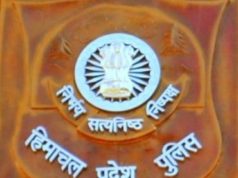A retired soldier who later served as a teacher lost ₹61.29 lakh in a sophisticated digital fraud, where scammers posed as Mumbai police officials. The case, which has left Una district residents in shock, was registered at Haroli police station, highlighting the growing threat of cybercrimes exploiting fear and manipulation.
On November 22, while the victim was sowing wheat in his fields, he received a message from a person identifying himself as Inspector Hemraj Koli from the Mumbai Police. The caller claimed that 17 complaints had been filed against the victim at Tilak Nagar Police Station, Mumbai. Soon after, another person, posing as Sub-Inspector Sandeep Rao, claimed that a man named Naresh Goyal had been arrested in a money laundering case, with an ATM card in the victim’s name discovered during the investigation.
The fraudsters sent fake documents to substantiate their claims and pressured the victim by stating the case was linked to “national security.” Using fear as a tool, they coerced the victim into transferring his entire savings to their accounts under the guise of an official investigation.
How the Victim’s Savings Were Drained
The fraudsters methodically drained the victim’s finances:
- They convinced him to break his wife’s fixed deposits worth ₹27.5 lakh and transfer the amount via RTGS.
- ₹15 lakh from his Senior Citizen Savings Scheme was siphoned off.
- Mutual funds worth ₹5.87 lakh and other joint account savings totaling ₹18.79 lakh were also transferred.
The scammers maintained control by sending fake Supreme Court receipts to legitimize the transactions and demanded the victim report to them every two hours via WhatsApp.
The fraud came to light when the victim, using his wife’s phone, tried to confirm the identity of Sandeep Rao. Realizing the interaction was fraudulent, he approached the police. Before he could act, the scammers escalated their threats, warning they would kill him if additional payments weren’t made.
Similar Incidents in Himachal Pradesh
Digital arrest frauds have become a growing menace in Himachal Pradesh, with multiple victims falling prey to similar scams. In Kangra district, a retired government employee lost ₹18 lakh after being accused of involvement in a fake drug trafficking case. The fraudsters impersonated central agency officials, pressuring him to transfer money under the pretext of clearing his name.
In Shimla, another individual was duped of ₹9 lakh when scammers linked his bank account to a fabricated money laundering case. In Mandi, a businessman lost ₹22 lakh after receiving fake Income Tax Department notices alleging tax evasion.
Understanding Digital Arrest Frauds
Digital arrest frauds often involve scammers impersonating police or government officials to accuse victims of fabricated crimes. Using fake IDs, legal documents, and even court receipts, they create a false sense of urgency, coercing victims into transferring funds.
Key tactics include:
- Fabricating accusations of crimes or legal violations.
- Using threats to instil fear and urgency.
- Sending fake receipts or notices to make the scam appear legitimate.
Prevention Tips
Authorities advise residents to follow these measures to protect themselves:
- Verify Claims: Always verify any claims of legal accusations directly with official authorities.
- Do Not Panic: Legitimate police or government officials never demand money over the phone or online.
- Report Suspicious Activity: Immediately report fraudulent calls or messages to the local police or the cybercrime portal.
Police Investigation Underway
Haroli police station in-charge Sunil Sankhyan confirmed that an FIR has been registered, and investigations are in progress. Cybercrime experts are being consulted to track down the fraudsters and recover the victim’s funds.
This case underscores the urgent need for public awareness about cyber fraud. As scams become increasingly sophisticated, individuals must remain vigilant, question suspicious claims, and prioritize financial safety. Authorities are urging residents to spread awareness to prevent further cases of digital fraud in the region.











